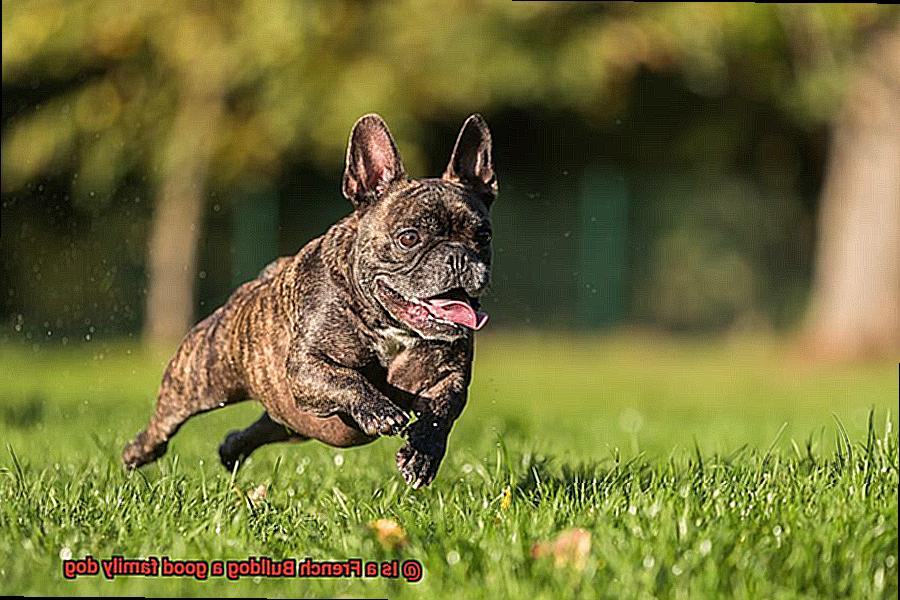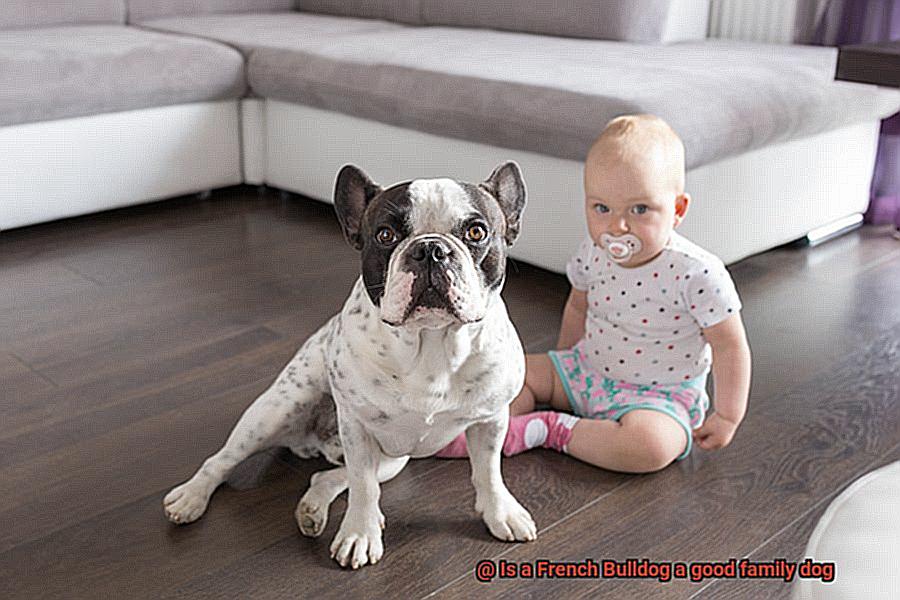Is a French Bulldog a good family dog?
Welcome to our blog, where we dish out all the juicy info you need. Today, we’re tackling a burning question that families everywhere ask themselves: “Is a French Bulldog a good family dog?”
These little cuties have been stealing hearts left and right with their adorable looks and lovable personalities. But before you jump on the French Bulldog bandwagon, there are some important things to consider.
So, buckle up and let’s see if these Frenchies are fit for your crew.
Temperament of the French Bulldog
Contents
- 1 Temperament of the French Bulldog
- 2 Size and Exercise Requirements for a French Bulldog
- 3 Adaptability of the French Bulldog
- 4 Are French Bulldogs Child-Friendly?
- 5 Training and Socialization for French Bulldogs
- 6 Health Considerations for Owning a French Bulldog
- 7 The Pros and Cons of Having a French Bulldog as a Family Pet
- 8 Tips for Raising a Happy and Healthy French Bulldog
- 9 Conclusion
French Bulldogs are small, affectionate dogs known for their friendly and playful nature. With their adorable bat-like ears and expressive eyes, they capture the hearts of dog lovers around the world. But what sets their temperament apart? Let’s dive into the delightful personality traits that make French Bulldogs an excellent choice for families.
Affectionate and Friendly:
French Bulldogs are renowned for their loving and affectionate nature. They thrive on human companionship and enjoy being part of a family. Their friendly disposition makes them great with children, as they are patient and tolerant. Whether it’s snuggling up on the couch or joining in on playtime, French Bulldogs are always eager to shower their loved ones with affection.
Playful and Energetic:
While not overly hyper or demanding, French Bulldogs have a playful side that adds an element of fun to any household. They love interactive games and toys, keeping both children and adults entertained. Their energy levels are moderate, making them adaptable to various lifestyles and living situations. A short walk or a romp in the backyard is usually enough to satisfy their exercise needs.
Adaptable and Easygoing:
French Bulldogs are incredibly adaptable dogs. They can thrive in both urban apartments and suburban homes, making them suitable for families with diverse living arrangements. Their easygoing nature allows them to adapt to different schedules and activities, ensuring they fit seamlessly into your family’s routine.
Laid-back Companionship:
French Bulldogs are known to be excellent companions for both active and more laid-back households. While they enjoy playtime and outdoor activities, they are also content to curl up on the couch for some quality relaxation time with their owners. Their calm demeanor and love for cuddling make them perfect partners for cozy evenings at home.
Protective Watchdogs:
Don’t let their small size fool you – French Bulldogs have a protective streak when it comes to their families. They are naturally alert and will bark to alert you if they sense something amiss. This innate protective instinct makes them excellent watchdogs, providing an extra layer of security for your home.
Size and Exercise Requirements for a French Bulldog
When it comes to French Bulldogs, size matters, but not in the way you might think. These adorable little pups are small in stature, typically weighing between 16-28 pounds and standing about 11-12 inches tall at the shoulder. But don’t let their compact size fool you – these dogs are all muscle.
French Bulldogs are like the Arnold Schwarzeneggers of the dog world, with their sturdy and muscular build. They may be small, but they are strong. So, if you’re worried about them being delicate or fragile, fear not. These little bulldogs can hold their own.
Now, let’s talk about exercise requirements. French Bulldogs may not be marathon runners, but they still need their daily dose of physical activity to keep them happy and healthy. Think of them as the Goldilocks of exercise – not too much, not too little, but just right.
A daily walk around the neighborhood or a play session in the backyard is usually enough to satisfy their exercise needs. They enjoy exploring their surroundings and sniffing every blade of grass in sight. Plus, these little rascals love interactive playtime with their favorite humans. Whether it’s a game of fetch or a tug-of-war session, they’ll be wagging their tails with glee.
But remember, French Bulldogs are brachycephalic dogs, which means they have a short muzzle and flat face. This adorable feature can sometimes make it harder for them to breathe and regulate their body temperature. So, when it’s hot outside or during intense exercise, take it easy. Give them plenty of breaks and access to fresh water to keep them cool and comfortable.
Water activities can also be a great way to exercise your French Bulldog. Some of them might enjoy splashing around in the pool or taking a dip in the lake. But be cautious – not all French Bulldogs are natural-born swimmers. Some might need a little help or even a life jacket to stay afloat. Safety first, my friends.
Adaptability of the French Bulldog
If you’re considering adding a furry friend to your family, you’re in for a treat. French Bulldogs are not only adorable but also incredibly adaptable. In this blog post, we’ll dive into their adaptability and why they make fantastic family dogs. So, grab a cup of coffee and let’s get started.
Adaptability in Living Situations:
French Bulldogs are the perfect companions for city dwellers and apartment living. Their small size and low energy levels mean they don’t require a spacious yard to be happy. They adapt well to smaller homes and urban environments, making them an excellent choice for families living in tight spaces.
Easygoing Nature:
French Bulldogs have a laid-back personality that allows them to adjust easily to different situations and environments. Whether you have a bustling household with kids and other pets or a quieter home, these adaptable pooches will fit right in. Their calm demeanor creates a harmonious atmosphere, adding joy to family life.
Great with Kids:
If you have little ones at home, rest assured that French Bulldogs are fantastic playmates. Known for their friendliness, affection, and patience, these furry pals are well-suited for children of all ages. They can handle the rough-and-tumble antics of kids while maintaining their gentle nature. Your kids will have a loyal companion by their side, creating memorable moments filled with laughter and love.
Moderate Exercise Needs:

French Bulldogs strike the perfect balance when it comes to exercise requirements. While they enjoy daily walks and playtime, they don’t demand excessive physical activity like some other breeds. This adaptability makes them an ideal pick for families who may not have ample time or energy for high-intensity workouts but still want a furry friend that can keep up with their lifestyle.
Climate Adaptation:
French Bulldogs may be sensitive to extreme temperatures due to their short snouts, but with proper care and precautions, they can adapt comfortably to different climates. Keep them cool during hot summers and cozy during chilly winters, and they’ll be happy-go-lucky companions all year round.
Are French Bulldogs Child-Friendly?
French Bulldogs are widely regarded as child-friendly pets due to their friendly and affectionate nature. Here are several reasons why French Bulldogs make great companions for children:
- Playful and Fun-Loving Personalities: French Bulldogs have a playful and energetic disposition that makes them excellent playmates for kids. They enjoy interactive games and will happily join in on the fun, whether it’s a game of fetch or chasing bubbles in the backyard.
- Patient and Tolerant: French Bulldogs are known for their patience and tolerance, even when children are being overly energetic or a little rough during playtime. They have a gentle nature and are generally understanding of a child’s behavior.
- Thrive on Human Interaction: French Bulldogs thrive on human companionship and enjoy being part of a family. They form strong bonds with their owners, including children, and love to be involved in their daily activities. This trait makes them well-suited for households with kids.
- Non-Aggressive Nature: While no dog is entirely predictable, French Bulldogs are generally not aggressive towards children. However, it is crucial to supervise interactions between dogs and kids to ensure the safety of both parties.
To ensure a harmonious relationship between your French Bulldog and child, it is essential to teach your child how to properly interact with the dog:
- Teach them to approach the dog calmly and avoid pulling on their ears or tail.
- Respect the dog’s personal space and avoid disturbing them during meal times or taking away their toys.
- Early socialization and training are vital in establishing good behavior around children.
Despite their small size, French Bulldogs are sturdy and robust, making them less prone to injury when playing with kids. However, it is still important for parents to teach their children how to interact responsibly with dogs and always supervise their interactions.
Training and Socialization for French Bulldogs
When it comes to French Bulldogs, training and socialization are key to raising a well-rounded and obedient family member. These intelligent and eager-to-please dogs are relatively easy to train, but starting early and being consistent is crucial. So, let’s dive into why training and socialization are so important for your French Bulldog.
Potty Training: The First Step to Success

Just like any other dog, potty training is a must for French Bulldogs. Consistency is the name of the game here. Establishing a routine for taking them outside or using puppy pads will help them understand where and when it’s appropriate to relieve themselves. And don’t forget the positive reinforcement. Treats or praise when they eliminate in the desired area will go a long way.
Obedience Training: Safety and Manageability
Basic obedience training is essential for French Bulldogs. Teaching them commands like sit, stay, come, and leave it will not only make them more manageable but also ensure their safety in various situations. Keep training sessions short and frequent, as French Bulldogs have shorter attention spans. And remember, rewards are the key to their hearts. Treats or toys will motivate them to learn and perform the desired behaviors.

Socialization: Building Confidence and Reducing Anxiety
French Bulldogs thrive on human interaction, but exposure to different people, animals, and environments from an early age is crucial for their social development. This helps them build confidence and reduces the chances of fear-based aggression or anxiety later in life. Puppy socialization classes or playdates with other friendly dogs can be a game-changer for your French Bulldog. Just make sure to supervise these interactions and ensure they are positive experiences.

Patience and Persistence: The Keys to Success
French Bulldogs can be a tad stubborn at times, so patience and persistence are necessary when training them. Stay calm and avoid using harsh punishment methods that can damage your bond. Instead, focus on positive reinforcement techniques that reward good behavior and redirect unwanted behaviors. Consistency is crucial, so establish clear rules and boundaries from the start. Get the whole family on board with consistent commands and rewards to prevent confusion.
Health Considerations for Owning a French Bulldog
French Bulldogs are undeniably adorable with their squishy faces and compact bodies. But before you bring one of these lovable pups into your home, it’s important to be aware of the health considerations that come with owning a French Bulldog. Here are some key things to keep in mind:
- Brachycephalic Anatomy: French Bulldogs have a short-nosed, or brachycephalic, anatomy. While this adds to their charm, it can also cause breathing difficulties and overheating. Their flat faces can lead to narrowed airways, making it harder for them to breathe properly. To keep them comfortable, monitor their activity levels and ensure they have access to shade and water in hot weather.
- Allergies: French Bulldogs are prone to allergies, which can manifest as skin irritations or gastrointestinal issues. They may be allergic to certain foods, environmental factors, or even certain fabrics. Pay attention to their diet and environment, and consult with a veterinarian if any allergies or sensitivities arise.
- Skin Issues: French Bulldogs are also prone to skin issues like dermatitis or dry skin. Regular grooming is essential to maintain their skin health. Use mild products specifically formulated for dogs and avoid harsh chemicals that could irritate their sensitive skin.
- Eye Problems: French Bulldogs are more susceptible to eye problems such as cherry eye, cataracts, and corneal ulcers. Regular eye examinations by a veterinarian can help identify any issues early on and prevent further complications.
- Joint Problems: Joint problems like hip dysplasia or patellar luxation can cause pain and mobility issues for French Bulldogs. Regular exercise and maintaining a healthy weight can help reduce the risk of joint problems.
- Weight Management: French Bulldogs have a tendency to gain weight easily, which can lead to various health issues including heart problems, joint stress, and respiratory difficulties. Watch their diet and ensure they get enough exercise to maintain a healthy weight.

The Pros and Cons of Having a French Bulldog as a Family Pet
Are you considering getting a French Bulldog as a family pet? These adorable little dogs are known for their friendly and affectionate nature, making them excellent companions for families. However, like any breed, there are both pros and cons to owning a French Bulldog. Let’s take a closer look at what you can expect.
Pros:
- Adaptability: French Bulldogs are adaptable to different living situations. Whether you live in a small apartment or a larger home, these dogs can thrive in various environments.
- Good with children: French Bulldogs are generally good with children and can be patient and gentle. However, it is always important to supervise interactions between young children and dogs to ensure their safety.
- Low exercise needs: Unlike some high-energy breeds, French Bulldogs have relatively low exercise needs. This can be beneficial for families with busy schedules or limited outdoor space.
- Loyalty and protection: French Bulldogs are known for their loyalty and protective instincts towards their families. They can make excellent watchdogs and will alert you to any potential threats or intruders.
Cons:
- Health issues: One major drawback of owning a French Bulldog is their tendency to develop certain health issues. Their flat faces make them prone to respiratory problems, which can lead to difficulties in breathing and increased vulnerability to heat.
- Stubbornness: French Bulldogs can be stubborn and independent-minded, which can make training a challenge. Consistent and patient training methods are necessary to ensure they understand and follow commands.
- Separation anxiety: These dogs thrive on human companionship and may experience separation anxiety when left alone for long periods. They may become anxious or exhibit destructive behavior if not given enough attention.
- Expense: Owning a French Bulldog can be quite expensive. They are a popular breed, which means they often come with a higher price tag compared to other breeds. Additionally, their potential health issues may require regular veterinary care and additional expenses.
Tips for Raising a Happy and Healthy French Bulldog
French Bulldogs are adorable, affectionate, and make great family pets. If you’re lucky enough to have one, it’s important to provide them with the best care possible to ensure they live a happy and healthy life. In this article, we’ll share some valuable tips on nutrition, exercise, grooming, socialization, training, health monitoring, and the importance of love and attention.
Provide Proper Nutrition:
Consult with your veterinarian to determine the best type of food and feeding schedule for your Frenchie. High-quality dog food formulated for small breeds is recommended. Avoid overfeeding to prevent obesity.
Regular Exercise:
Daily walks or playtime in a secure yard are important for your Frenchie’s physical and mental stimulation. Be mindful of extreme temperatures as French Bulldogs are sensitive to heat and cold.
Grooming and Hygiene:
Brush their coat regularly to remove loose hair and keep it shiny. Clean their ears, trim their nails, and brush their teeth regularly to prevent infections and dental problems.
Socialization:
Expose your Frenchie to various environments, sights, sounds, and experiences from a young age to help them become well-rounded and confident dogs.
Training and Mental Stimulation:
Use positive reinforcement techniques such as rewards and praises during training sessions. Basic obedience training strengthens the bond between you and your Frenchie while providing mental stimulation.
Health Monitoring:
Regular veterinary check-ups are crucial to catch any potential health issues early on. Be proactive in addressing conditions such as breathing difficulties, allergies, and joint problems.
Love and Attention:
French Bulldogs thrive on human companionship. Spend quality time with your Frenchie, including cuddling, playing, and engaging in activities together.
YmNTJKu_7uw” >
Conclusion
In conclusion, a French Bulldog is indeed an excellent choice for a family dog.
Their loving and affectionate nature makes them great companions for children and adults alike. With their small size and adaptable temperament, they can easily fit into any living situation, whether it’s a spacious house or a cozy apartment.
Furthermore, their playful and energetic personality ensures that there will never be a dull moment with a French Bulldog around. They are also known for being intelligent and eager to please, making them relatively easy to train.
Additionally, their low exercise requirements make them suitable for families with busy schedules. However, it is important to note that French Bulldogs may require some extra care due to their brachycephalic (short-nosed) anatomy, which can lead to certain health issues.
Therefore, regular veterinary check-ups and proper attention to their well-being are essential.




